FOLKLIFE CONCERTS
A free noon concert series co-presented by the American Folklife Center and the Music Division at the Library of Congress in cooperation with the Kennedy Center Millennium Stage.![]() All concerts are in the Coolidge Auditorium (located on the Ground Floor of the Thomas Jefferson Building of the Library of Congress). NO TICKETS REQUIRED.
All concerts are in the Coolidge Auditorium (located on the Ground Floor of the Thomas Jefferson Building of the Library of Congress). NO TICKETS REQUIRED.
2012 SEASON
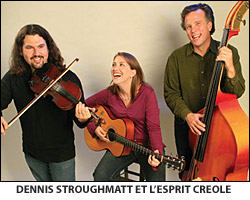 Dennis Stroughmatt et L’Esprit Creole
Dennis Stroughmatt et L’Esprit CreoleUpper Louisiana French Creole Music from Missouri
Dennis Stroughmatt, born and raised in southeastern Illinois, is an authority on French Creole music and culture of “Upper Louisiana,” aka Illinois, Missouri, and Indiana, which came to the United States as part of the Louisiana Purchase. By an amazing string of chance events, young Dennis Stroughmatt came upon the descendants of French Midwestern settlers, and he spent over three years in southeast Missouri learning to speak Illinois French Creole, play the fiddle, and sing many of the traditional songs that have thrived in the region for over three hundred years. He would also go on to live, work and play music in the “Cajun country” of Louisiana, and to study in Quebec, thus completing the circle of French culture in North America. With the blessing of the Creole people of the Midwest, Dennis Stroughmatt et l’Espirit Creole are its passionate ambassadors, expanding interest and excitement in a region that has been, in many ways, ignored by the history books. As a result, the French music, language, stories, and culture once hidden away in the Missouri Ozarks now has a voice in the wider world. As they say in the hills: “On est toujours icitte: We are still here!” Learn more: www.creolefiddle.com
 Unukupukupu
UnukupukupuHālau Hula (Hula School) of Hawai`i Community College, Hilo, Hawai`i
Unukupukupu is the traditional Hālau Hula (Hula School) of Hawai`i Community College, Hilo, Hawai`i ![]() . Here ancient dances and songs, rooted in the sacred `Aiha`a Pele (Ritual Dance of Volcanic Phenomena) intermingle with the rigor of academic inquiry. To experience the particular fiery style of hula termed `Aiha`a Pele, one is trained to call up the fire within the body and to dance until sweat shines at the temples and forehead. Under the cultural and academic stewardship of Dr. Taupōuri Tangarōto, Unukupukupu is a community of traditional dancers functionally aware that Hula is one of the world’s sacred dances of environmental kinship and global connections.
. Here ancient dances and songs, rooted in the sacred `Aiha`a Pele (Ritual Dance of Volcanic Phenomena) intermingle with the rigor of academic inquiry. To experience the particular fiery style of hula termed `Aiha`a Pele, one is trained to call up the fire within the body and to dance until sweat shines at the temples and forehead. Under the cultural and academic stewardship of Dr. Taupōuri Tangarōto, Unukupukupu is a community of traditional dancers functionally aware that Hula is one of the world’s sacred dances of environmental kinship and global connections.
 Ruže Dalmatinke
Ruže DalmatinkeTraditional Croatian Singing from Washington State
Ruže Dalmatinke, from Seattle, Washington. Deep passion and intense devotion to Croatian musical heritage have kept the group active since 1981, and have inspired the group's lead vocalists, sisters Binki and Alma, since childhood. Binki Franulovic Spahi (lead voice) and Alma Franulovic Plancich (second voice) lead Ruze Dalmatinke in singing, and are responsible for the group's adherence to traditional purity in their music. From the town of Vela Luka on the island of Korcula, Dalmatia, Croatia, they immigrated with their family to the United States after World War II. Having sung together since childhood, the sisters brought with them their lifestyle of singing, as well as an oral tradition generations old. Their voices are accompanied by instrumentation, adding to the vocal harmonies. The band members, also vocalists, along with Binki and Alma, perform music from the many different regions of Croatia - from the tranquil Dalmatian ballads to the strident melodies of the interior.
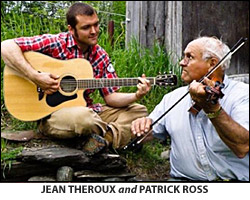 Les Bon Hommes Du Nord: Patrick Ross and Jean Theroux, with Dalton Binette and Bow Thayer
Les Bon Hommes Du Nord: Patrick Ross and Jean Theroux, with Dalton Binette and Bow ThayerFrench-Canadian Fiddle Music & Songs from New Hampshire
Patrick Ross and Jean Theroux will present a program of fiddle tunes and songs drawn from their French-Canadian heritage. Ross, a frequent winner at fiddle contests throughout Northern New England, is a fifth-generation fiddler. Theroux is a well respected community-based fiddler and vocalist. They will be joined by Dalton Binette and Bow Thayer. All four musicians hail from the northernmost area of New Hampshire, adjacent to the Canadian border, across which people and cultural influences have flowed steadily over the last hundred years or more. The fiddle, accordion, and guitar are the most common instruments used in French-Canadian music. The playing style is spirited and based upon rhythmic patterns of the Celtic world: jigs, reels, and waltzes. However, the music is not exactly Celtic: the bowing style has a different swing and the tunes are ornamented in a distinctive way. Singing in the French language with family and friends is also an important part of French-Canadian musical heritage, and many of the songs are classified as “chansons à répondre,” or “call and response,” a style developed so a large group can join in the fun without knowing all the words.
 Robert Shafer, Robin Kessinger and Bobby Taylor
Robert Shafer, Robin Kessinger and Bobby TaylorFlatpick Guitar and Fiddle Music from Kanawha County, West Virginia
Bobby Taylor, Robert Shafer, and Robin Kessinger, three of the Kanawha Valley’s best traditional musicians, have played together over many years at various musical events in the Valley and throughout West Virginia. They were heavily influenced by the musical talents of Clark Kessinger, a world renowned fiddler. Clark Kessinger recorded many tunes on the Brunswick label from 1928 to 1930, and later, five albums in the 1960s. He has influenced a world of fiddlers and musicians for many decades. Clark Kessinger lived near where Robert, Robin and Bobby grew up in the Kanawha Valley, and Robin is his great nephew. This trio uses Clark’s beautiful arrangements as a foundation for the music they play. Just like Clark Kessinger, who used every technique possible, they continue to explore new and exciting ways to play the great old tunes.
 The Singing and Praying Band
The Singing and Praying BandAfrican American A Capella Sacred Music from Delaware and Maryland
The Singing and Praying Bands of Delaware and Maryland (Eastern and Western Shore) belong to an African American devotional/musical tradition that is unique to the Delmarva region, probably the oldest living African American musical tradition in Delaware and Maryland. In the past, almost half of the Methodist churches around the Delaware and Chesapeake Bays had their own band. With origins in West African religion, Christianity, and African American ring shout traditions, Singing & Praying Bands developed during slavery. The ministry of the Singing & Praying Bands takes place in host churches, often at a camp meeting after an evening preaching service is over. Members line out a hymn, pray a prayer, and end with a spiritual in which the group forms a circle, marching counterclockwise out onto the church grounds. Since the 1950s, the bands have diminished in number, and the singers have consolidated into one large band comprised of fifty to a hundred active members from twenty to thirty different churches. They come together most Sundays in the spring, summer, and fall, at a different church each week, and hold service there, keeping this tradition alive.
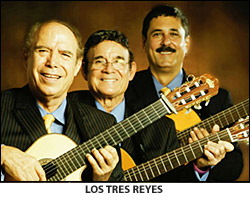 Los Tres Reyes
Los Tres ReyesMexican Trío Romántico from Texas
The Mexican trío romántico consists of three suave male voices backed by two, and sometimes three, guitars, singing romance-drenched lyrics in lush harmony. The style rocketed to pan-Latin popularity in 1948 with the pioneering group Trío Los Panchos. Los Tres Reyes (The Three Kings), known as “the last of the great trios,” epitomize the trio sound and continue to make it a mainstay of Mexican acoustic music. High-voice Cuban singer Bebo Cárdenas joins founding members, brothers Gilberto and Raúl Puente, to show us how, in Cárdenas’s words, “The trío romántico is synonymous with intimacy.” The trio has a new album on the Smithsonian Folkways label called Romancing the Past (SFW40562).
 Mariano Gonzalez y sus Invitados Especiales (Mariano Gonzalez and his Special Guests)
Mariano Gonzalez y sus Invitados Especiales (Mariano Gonzalez and his Special Guests)Paraguayan Folk Harp Ensemble from Nevada
The Paraguayan folk harp is one of the most recognizable folk music traditions in South America. Las Vegas resident Mariano Gonzales mesmerizes audiences with his delightful and sometimes surprising repertoire on this handcrafted traditional instrument. Mariano’s career as a professional harpist, composer, and harp maker has taken him around the world and into multiple musical genres, but he remains enamored of the unique and exquisite Guarania folk music of his homeland. Born and raised in Buena Vista, Paraguay, he began playing the harp at the age of five, under the tutelage of his father and grandfather. His passion for music propelled him onto the world stage where he expanded his repertoire to include lively Latin rhythms, free-spirited jazz, and original arrangements of popular standards. Since moving to Las Vegas to tour with Tony Orlando and Dawn, he has generously shared his beloved harp with local audiences in community venues. His solo performances have included concerts at prestigious venues including Carnegie Hall in New York and Suntory Hall in Tokyo.
2011 SEASON
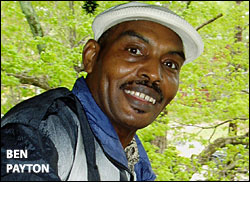 Ben Payton and the Thundering Harps
Ben Payton and the Thundering HarpsTraditional Blues from Mississippi
Ben Payton's vice resonates with a passion for life and his skills as a guitarist evoke the tradition of the original Delta blues greats such as Robert Johnson, Tommy Johnson, Charley Patton, and Son House. He was born in tiny Coila, Mississippi, in the hill country just east of the Delta. His early musical influences included his grandmother Mabel Johnson’s gospel piano playing and his Uncle Joe Birch’s blues guitar. When in his mid-teens, Ben moved to Chicago, where he soon became active in the city’s blues scene. He worked regularly with Bobby Rush and Joe Evans and the Supersonics. Ben also played in the R&B bands The Oops and Womb From the Tomb. In 1970 Ben traveled to Morocco with jazz pianist Randy Weston, and stayed for a six-month engagement at a club. Ben was part of the R&B group Chicago Sounds, which opened the show and also backed Weston. Back home in Chicago, Ben worked with artists including Eddie Shaw and the Wolf Gang, Junior Wells, Fenton Robinson, Little Mack Simmons, Barkin’ Bill Smith, Taildragger, Alvin Cash, Eddie C. Campbell, Bobby King, Big Moose Walker, Muddy Waters Jr., Vince McCollum, Tony Gooden, Doug McDonald, Ron Harris, and Ike Anderson. In 1977, Ben left the music scene but performed occasionally. In 2002, he moved back to his home state of Mississippi, and he returned to his roots, performing Delta-style blues. He will be performing at the Library with Steve Chester on rhythm guitar, Cyndi Clark on conga drums, and Kindrick Hart on electric bass.
 Tony Ellis and the Musicians of Braeburn
Tony Ellis and the Musicians of BraeburnTraditional Banjo and Stringband music from Ohio
Tony Ellis is a prominent bluegrass banjo and fiddle player. He performed with Bill Monroe and the Bluegrass Boys, the originators of the bluegrass style, both at the Grand Ole Opry and on tour, for over two years, recording some 25 songs with them. In 1962 he received a standing ovation at Carnegie Hall when playing with the famous Mac Wiseman. Tony has performed and lectured at numerous colleges, universities, and music festivals throughout the country, including the 1986 Statue of Liberty Celebration in New York City. Tony has toured both Japan and Latin America as a musical ambassador. Tony opened the Folk Masters Series at Wolf Trap in 1994, played at the 1996 Olympics in Atlanta, and performed for President Clinton’s Campaign tour. He has toured Australia (1999), New Zealand (1999 and 2000), Ireland (1999) and Great Britain (1999 and 2000). Tony has been interviewed on NPR’s All Things Considered, by Pulitzer Prize winner Studs Terkel, and by the BBC. His music has been included on Ken Burns’ Baseball series on PBS, on the BBC film documentary Echoes of America, on the popular TV series Party of Five, and in other theater and film productions. All of Tony’s recordings have received critical acclaim. Tony has composed over eighty tunes and received eleven awards from ASCAP (American Society of Composers and Publishers). Tony was nominated for the National Heritage Fellowship Award, the highest honor America pays to her traditional artists. Accompanied by the Musicians of Braeburn (Tony’s son, acclaimed singer/songwriter and fingerstyle guitarist William Lee Ellis, Tony’s wife Louise Adkins on pump organ and Larry Nager on upright bass, mandolin and triple washboard), Tony Ellis presents an epic patchwork of American music, reaching from the Mississippi Delta to the Carolina Piedmont, from deep blues to joyful reels, from elegant waltzes to heart-wrenching Scottish airs.
 Tim Tingle and D.J. Battiest-Tomasi
Tim Tingle and D.J. Battiest-TomasiTraditional Choctaw storytelling and music from Oklahoma
Both D. J. Battiest-Tomasi and Tim Tingle are enrolled as members of the Choctaw Nation of Oklahoma and regularly participate in tribal events. Both also share relatives who came on the Trail of Tears from the original Choctaw homelands in Mississippi. They speak Choctaw as a part of their performances. They normally perform individually, but have been asked to perform together on this occasion.
Tim is a traditional singer, flute player, and drummer, and a nationally known performance storyteller, as well as a teacher, writer, and lecturer. He delivers lively historical and traditional stories, accompanying himself on the Native American flute, and sings Choctaw songs to the rhythms of a whaleskin drum. From 2002 to the present, Tingle has performed a traditional Choctaw story before Chief Gregory Pyle's Annual State of the Nation Address at the tribal gathering in Tushkahoma, Oklahoma, a Choctaw reunion that attracts over thirty thousand people. D. J. is also a flute player and storyteller, and works as a family counselor. Both have performed extensively across Oklahoma and are considered to be ambassadors of the Choctaw people, and both have recorded CDs of stories and music. Their favorite activity is to visit with elders immersed in oral tradition.
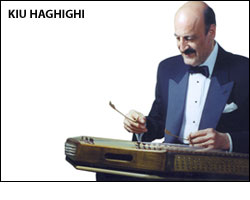 Kiu Haghighi with Tooraj Moshref-Zadeh
Kiu Haghighi with Tooraj Moshref-ZadehPersian santour and tombak music from Illinois
Kiu Haghighi is known as a virtuoso in concert halls around the world on the santour, or Persian hammered dulcimer. Kiu began his lifetime study of the santour at the age of ten. At nineteen he was invited to join the Iranian Ministry of Education and Art. There he performed as the featured soloist in the Academy Orchestra and performed regularly on National Iranian Television. Kiu was an instructor at the Ministry of Education and Art until 1965, when he left Iran for study in the United States. His musical career in North America has included numerous performances in colleges, universities and concert halls. Kiu's work as both a performer and a composer on the santour combines and blends traditional Iranian forms with contemporary ones. A master of all the twelve melody types used as a basis for Iranian classical improvisation, Kiu has expanded the technical possibilities of the santour. His unusual speed in the movement of the leather-tipped mallets called mezrab is both well-known and extraordinary. Audiences always remember the energy and vigor of expression in his musical performances. He will be accompanied by Tooraj Moshref-Zadeh on the tombak, a Persian drum.
 Ann Yao Trio
Ann Yao TrioTraditional Chinese zheng music from Florida
Ann Yao plays the zheng, a long, horizontal plucked zither that is one the most ancient musical instruments in China. Born into a family of musicians in Shanghai, she grew up immersed in Chinese folk and classical music. Ann moved to the U.S. in 1985, and began performing as a zheng soloist at Disneyworld’s Epcot Center in the early 1990s. She has performed at Lincoln Center, Carnegie Hall, the Metropolitan Museum of Art, and other venues with the innovative ensemble Music From China, which promotes modern Chinese musical culture while preserving ancient Chinese music. Yao has also participated in a documentary project about Tang-era (618-907 A.D.) music, and has performed premier works featuring Yo-Yo Ma, Chen Yi, Tan Dun, Zhou Long, among others. She participated as a master artist in the Florida Folklife Apprenticeship Program in 1999 and 2008, and was recognized as a Florida Heritage Award Winner in 2009. She will be joined in this performance by Wang Guowei playing the erhu, a two-stringed fiddle, and by Chen Yihan, playing the pipa, a pear-shaped lute.
 Daniel Boucher and Friends
Daniel Boucher and FriendsTraditional French-Canadian fiddle music from Connecticut
Daniel Boucher is a dynamic young fiddler born and raised in the French Canadian community in Bristol, Connecticut. Learning tunes and styles from family and friends in Connecticut and Quebec, Daniel plays across New England with many artists including Josée Vachon and the Beaudoin Family. Daniel revitalized the Franco-American music scene in central Connecticut with his bi-weekly gathering called Jam Français, and he organizes hugely popular soirées and events with French music and food. He will be accompanied by his father Jules Boucher on accordion, harmonica, and limberjack; guitarist Ray Pelletier; and fiddler/stepdancer Glen Bombardier of the Beaudoin family.
 Sophia Bilides Trio
Sophia Bilides TrioTraditional Greek Smyrneika music from Massachusetts
Sophia Bilides sings and plays santouri (Greek hammered dulcimer) and zilia (finger cymbals). She has been called the foremost practitioner of Smyrneika, a cabaret tradition that originated among Greek refugees in Asia Minor. A second-generation Greek-Italian American, Sophia was raised in New Haven, Connecticut, where the refugees of the village of Permata, including her grandparents, had resettled. She grew up absorbing the songs of their generation, heard at weddings, dances, church events, and family gatherings. Despite many other musical influences vying for her attention, Sophia was drawn to the hearfelt and highly ornamented singing style of her Greek Asia-Minor roots. With many of the elders gone by the early 1980s, source material came primarily from her mentor, Dino Pappas, an important collector of early Greek recordings. She also collected songs from community members willing to sing into her tape recorder. Smyrneika songs arose out an urban population where the music of Greeks, Turks, Jews, and Armenians influenced each other in the early decades of the 20th century. This vibrant cultural scene was shattered when conflicts led to the 1922 Asia-Minor Catastrophe. The destruction of the port city of Smyrna (Izmir) led to the expulsion of two million Greeks from their homeland. Fortunately, highly skilled refugee musicians managed to keep alive their urban musical traditions by bringing their cosmopolitan talents to the Greek mainland and to America.
Her goal of sharing Smyrneika with as wide an audience as possible is reflected in her performance venues, which have included the Richmond Folk Festival, the American Folk Festival, Lincoln Center, the Lowell Hellenic Culture Society, The Astoria Ethnic Music Festival, and the Maliotis Greek Cultural Center’s Asia Minor Commemoration. Bilides was named a Traditional Arts Finalist in the MCC Artist Fellowships in 2006, 2008, and 2010.
 Agustín Lira and ALMA & QUETZAL
Agustín Lira and ALMA & QUETZALCantos de mi cantón / Songs from My Home
From the ashes of Los Angeles’ 1992 uprising arose a collective of East Side musicians committed to respectfully continuing the legacy of over 70 years of Chicano Rock. Standing on the shoulders of giants like Lalo Guerrero, Ritchie Valens, Cannibal and The Headhunters, The Brat, Los Lobos, and many others, Quetzal has created a path that has earned them the recognition as “one of Los Angeles’ most important bands” (L.A. Times). Quetzal has shared the stage with a diverse list of artists such as Los Lobos, Zack de La Rocha, Ziggy Marley, Los Van Van, Taj Majal, Daara J, Ruben Blades, Fishbone, Cubanismo, Littlefeat, and Ozomatli. Led by Martha Gonzalez (vocals, tarima, chekere, congas) and Quetzal Flores (jarana, requinto doble, bajosexto, electric guitar), Quetzal plays music that is as rich and complex as their pluri-ethnic barrio experience. Since 2002 Quetzal has been central in facilitating a transnational dialogue between Chicana/o musicians and artists from California and Mexicano musicians and dancers from Veracruz, Mexico. Quetzal most recently completed its fifth studio album, titled Imaginaries, to be released in early 2012 on the Smithsonian Folkways label.
Agustín Lira, a NEA National Heritage Fellow (2007), began his career in 1965, at the age of 19, when he co-founded the theater company El Teatro Campesino with Luis Valdez, during the Delano Grape Strike headed by Cesar Chavez. The company created songs and plays, performed at picket lines and rallies, and toured throughout the United States, demonstrating the power of artistic expression in uniting and inspiring the farmworker communities. Lira’s powerful singing and socially relevant lyrics were at the heart of El Teatro Campesino and established his role as the preeminent musical voice of the early Chicano Movement. Since leaving Campesino, Lira has formed several other theater groups, composed music for films and recordings, and received numerous awards. Together with Patricia Wells Solórzano, Lira formed the musical group Alma in 1979. Alma features original compositions by Lira and is known for its mesmerizing duets, inspirational lead guitar playing by Wells, and incomparable, rhythmic bass by Ravi Knypstra. Alma blends Mexican, Latin American, American Folk, and Afro-Cuban styles, creating a hybrid: Chicano music. Alma has performed throughout the United States, Mexico and Cuba, produced several recordings, and scored the music for the award-winning film documentary, The Fight in the Fields: Cesar Chavez and the Farmworkers’ Struggle.
The Alliance for California Traditional Arts promotes cultural traditions by providing advocacy, resources, and connections for folk and traditional artists. Recognized for its leadership, intellectual capital and excellence in program administration, ACTA is California’s state-designated entity for all folk and traditional arts.
